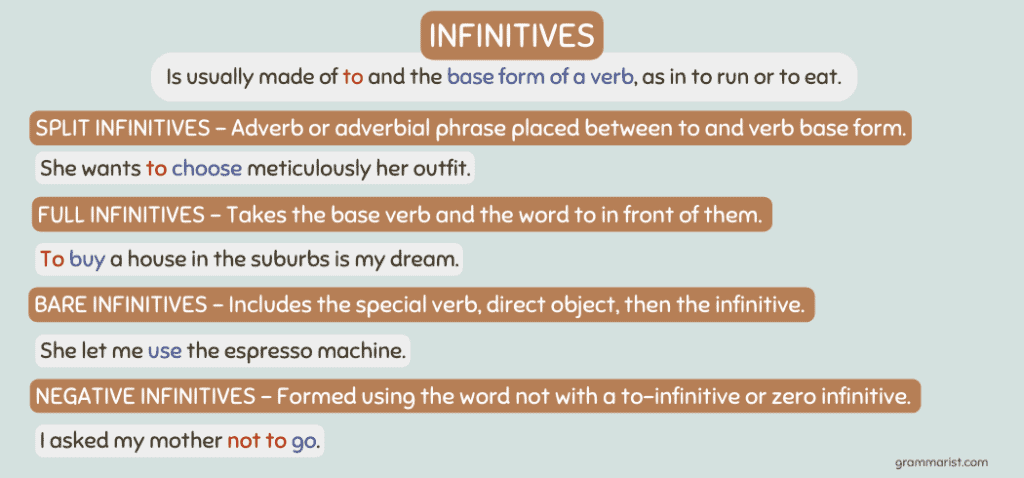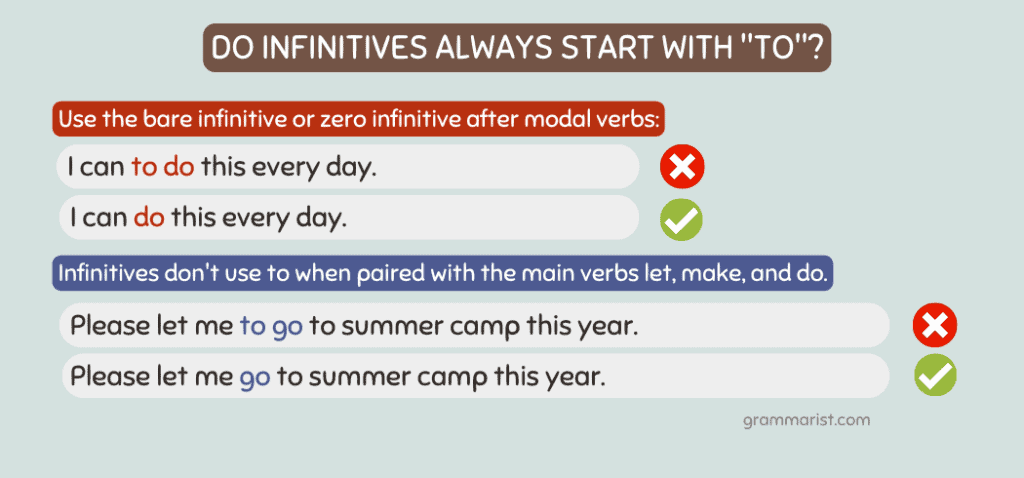Not all verbs show action. Others function as nouns, adjectives, or adverbs.
What is an infinitive? An infinitive is a type of non-finite verb usually formed using “to” and the base verb. To run, to teach, and to be are all examples of infinitives.
Learn about the definition and uses of infinitive verbs. I’ll show you the four main types of infinitives and their diverse functions in English sentences.
What Are Infinitives?

An infinitive in English grammar is usually made of to and the base form of a verb, as in to run or to eat.
This combination has a different function in the sentence, such as an adjective, adverb, or noun. Unlike a finite verb, an infinitive does not have a subject nor show tense.
For example:
- I want to see him.
The sentence uses the infinitive form of see, which is to see. It does not function as an actionable verb because the act of seeing is not really done.
In my own writing, I try and use bare infinitives as much as possible because I feel they make the story flow better. But it’s really a stylistic choice. Stick with me while I go over all types of infinitives.
What Are the 4 Types of Infinitives?
We usually think that the only infinitive form of a verb is to plus the base verb. But there are four main types you should know.
Split Infinitives
A split infinitive includes an adverb or adverbial phrase placed between to and the base form of the verb. One of the most celebrated split infinitives can be found in every episode of the famous show Star Trek:
- To boldly go where no one has gone before.
Notice how the order is to + single adverb + base verb. They do not say boldly to go or to go boldly because both are inaccurate.
But some grammar experts are divided on this. Some prescriptivists agree that they should be avoided, while others think they are acceptable.
If you want to keep your writing safe, it’s best to avoid them altogether. For instance, instead of saying this:
- The handbook will help you to conveniently fix the appliance.
You can say:
- The handbook will help you to fix the appliance conveniently.
But in some instances, split infinitives sound better in sentences. For example:
- She wants to choose meticulously her outfit.
This sentence sounds awkward. But when we use the split infinitive, it sounds smoother because it emphasizes the act of choosing.
- She wants to meticulously choose her outfit.
Full Infinitives
Full infinitives are the most common infinitives in writing, which take the base verb and the word to in front of them.
One famous full infinitive comes from William Shakespeare’s Hamlet:
- To be or not to be.
Don’t mistake an infinitive with a preposition phrase that starts with the common preposition to. Prepositional phrases do not have the base verb form after to but a noun, pronoun, or any modifier.
Here’s an example of a full infinitive in a sentence.
- To buy a house in the suburbs is my dream.
In this sentence, to buy is the full infinitive that functions as a subject of the sentence.
You might also find full infinitives after adjectives. For example:
- I’m happy to see you.
They may also be used with adverbs too and enough. For example:
- This sweatshirt is too small to keep me warm.
Bare Infinitives
Bare infinitives are more challenging to identify because they don’t have the word to. This special verb form can be spotted based on its structure, which includes the special verb, direct object, then the infinitive. For example:
- She let me use the espresso machine.
The special verb in this example is let, and the direct object is me. Use is the bare infinitive. Here is another example of a sentence with a bare infinitive.
- I don’t drink tea.
The main verb in the sentence is do, making drink a bare infinitive.
Negative Infinitives
The negative infinitive is formed using the word not with a to-infinitive or zero infinitive. That means it can have two basic structures.
- Not + base verb
- Not + to + base verb
Consider the sentence example below.
- I asked my mother not to go.
This statement uses a negative to-infinitive because it uses not with to and the base verb go.
Here are more examples of negative infinitives in sentences.
- Try not to use pretentious words.
- It’s a bad idea not to set up cameras outside your house.
- I do not drink milk.
A less common structure of negative infinitive is to + not + infinitive, although many grammarians do not recommend it. For example:
- My goal is to not stutter during my speech.
When to Use Infinitives
Infinitives of different forms also have different functions. Let’s discuss each.
Infinitives as Nouns

An infinitive can function as a noun or noun phrase. It names persons, places, things, or events. These words can function as subjects, subject complements, and direct objects. But infinitives cannot function as the object of prepositions like gerunds.
As a subject, an infinitive becomes the doer of the action. For example:
- To watch the band perform live is my biggest dream.
In this sentence, to watch is the subject.
Full infinitives can also be subject complements. They rename the subject and appear before a linking verb. For example:
- All I want is to eat tres leches.
To eat tres leches represents the subject All I want, and it comes before the linking verb is.
An infinitive can also be the object of the sentence, receiving the action verb. For example:
- I plan to throw her a party.
The direct object answers the verb with the word what. In this sentence, to throw her a party answers the question, “Plan what?”
Here are some common verbs that are followed by infinitives as objects.
- Afford
- Agree
- Arrange
- Ask
- Care
- Demand
- Expect
- Fail
- Forget
- Hope
- Offer
- Plan
- Prepare
- Stop
- Volunteer
- Wait
- Want
- Wish
Afford to go and agree to come are examples of phrasal verbs or the use of infinitives in phrases. These verbs usually have no actor between them and the infinitive direct-object phrase. For example:
- We agreed to attend the event.
Agreed to attend the event is a full infinitive phrase with no possible indirect object between them.
Infinitives as Adjectives
This type of verb can function as an adjective that modifies the meanings of nouns. Here are some examples of infinitives that act as adjectival modifiers.
- I need my mom to lecture me.
In this sentence, the infinitive to lecture modifies the noun mom.
- I need a chair to sit on while I’m studying.
- I want something to drink with my steak and fries.
- That’s a beautiful dress to wear to the party tonight.
Infinitives as Adverbs
As an adverb, an infinitive can also modify an adjective, verb, or a fellow adverb. This verbal offers additional information about the verb, often answering the question why. Consider this example.
- I was happy to meet your friend last night.
In this sentence, the infinitive to meet gives extra information about the adjective happy.
This sentence shows an infinitive before the main clause.
- To be a successful doctor, you must choose your specialization wisely.
Here are some examples of sentences with infinitives as adverbial modifiers.
- I got new glasses to see clearly.
- I promise to bring you new shoes on your birthday.
- She was very excited to hear the news about her father.
Infinitives After Auxiliaries
The infinitive can be used after modal verbs and semi-modal verbs. A modal verb is an auxiliary verb showing possibility, intent, necessity, or ability.
Below is an example of a sentence with a modal verb before an infinitive.
- I will buy a new book tomorrow.
In this sentence, the modal verb will comes before the infinitive buy.
This sentence uses a combination of a semi-modal verb or marginal modal before an infinitive.
- I used to watch her shows all the time.
Here are more sentence examples.
- We should follow the rules and regulations at work.
- There might be better policies.
Infinitives After Perception Verbs
Perception verbs, sense verbs, or stative verbs use bare infinitives of an active verb when the object takes an action. These perception verbs include hear, see, feel, taste, and more. The order is the main verb + object + bare infinitive. For example:
- I heard Dina arrive before Joey drove.
Here, the main verb is heard, followed by the object Dina and the bare infinitive arrive.
Here are more examples.
- I felt his hand brush mine.
- I watched you rock that dress last night.
Phrases With Most Relative Pronouns
Use the full infinitive after relative pronouns who, what, whom, where, and how. Do not use these pronouns with split and bare infinitives. For example:
- I don’t know what to get Jermaine for his birthday.
In this sentence, the relative pronoun is what and is followed by the full infinitive to get.
But why, as a relative pronoun, uses the bare infinitive, especially when making suggestions in interrogative form. For example:
- Why buy a new bottle when you can reuse the old one?
Infinitives With Let, Do, and Make
These verbs always use bare infinitives. Remember that make and let use a direct object. For example:
- Please let me live in peace.
In this sentence, let is the main verb. It’s followed by a direct object me and the bare infinitive live. But live is not the main action in the sentence.
Below are more sentence examples.
- I made my mother buy me new boots.
- She let me borrow her journal.
Infinitives Showing Intention or Purpose
We use infinitives to explain why a subject is doing something. The non-finite verb often replaces the phrase in order to to make the sentence more concise. For example:
- My brother left to meet with my dad.
In this sentence, the main verb is left. It is followed by the full infinitive to meet, which is the shortened version of in order to meet.
Here are more sentence examples.
- I’m writing to let you know that the package has arrived.
- Do you go to school to pursue your dreams?
What Is a Continuous Infinitive?
Continuous infinitives express continuing action after an auxiliary or verb. This infinitive uses to be and the present participle form of a verb. For example:
- I happened to be eating my pancakes when Josh went inside the restaurant.
The continuous infinitive in the sentence is to be eating.
Here are more examples of sentences with continuous infinitives.
- The ship is said to be sailing around the world for months.
- It’s nice to be working with you on this thesis paper.
- You should be studying hard for a good future.
What Is a Perfect Infinitive?
The perfect infinitive uses the structure to have plus the past participle verb form. To have forgotten and to have written are examples of perfect infinitives.
Consider the sentence below.
- I am happy to have seen Laura and Mike’s new baby.
The perfect infinitive in the sentence is to have seen.
Here are more examples of sentences with perfect infinitives.
- I wish to have tried my best during the competition.
- He pretended to have seen the movie.
- Your gift should have arrived last week.
What Is a Perfect Continuous Infinitive?
A perfect continuous infinitive uses the perfect and continuous verb form to express an action that was in progress but is now complete.
Use to have been with the present participle of the verb when forming the perfect continuous infinitive. For example:
- I must have been turning it off the whole time.
- The group appeared to have been cheating on the test.
What Is a Passive Infinitive?
A passive infinitive is the passive form of an infinitive. We use it to highlight the receiver or the action instead of the doer. It is formed using to be and the past participle form of the verb. For example:
- I wish to be nominated as the president of the club.
The passive infinitive is to be nominated. This sentence emphasizes the receiver of the action, which is I.
Here are more examples of passive infinitives in sentences.
- Kids like to be complimented even if they don’t ask for it.
- Education should be prioritized by the government.
- I wish to be promoted soon.
What Is an Infinitive Phrase?
Infinitive phrases are verb phrases containing the infinitive form of a verb and other modifiers. For example:
- I want to bake the cookie dough.
The infinitive verb in the sentence is to bake. The complement is its direct object, the cookie dough. The complete infinitive phrase is to bake the cookie dough.
Are Infinitives Verbs?
Infinitives are non-finite verbs because they do not have subjects and don’t show tense. They function as nouns, adjectives, or adverbs.
Other verb forms with different functions include the gerund and participle. Like infinitives, they either function as nouns or modifiers.
Do Infinitives Always Start with “To”?

Infinitives usually start with to. But others only include the base form of the verb, and they are called bare infinitives.
Use the bare infinitive or zero infinitive after modal verbs like may, can, might, could, should, and will. For example:
- Incorrect: I can to do this every day.
- Correct: I can do this every day.
You can also use the bare infinitive after perception verbs. For example:
- Incorrect: I saw you to leave the house.
- Correct: I saw you leave the house.
Infinitives don’t use to when paired with the main verbs let, make, and do. For example:
- Incorrect: Please let me to go to summer camp this year.
- Correct: Please let me go to summer camp this year.
They may also lose the word to on the second one when the sentence has a series of infinitives. For example:
- Incorrect: I want to finish my homework, to visit my friends, to watch the concert, and to have dinner with my family.
- Correct: I want to finish my homework, visit my friends, watch the concert, and have dinner with my family.
Let’s Practice Infinitives
Infinitives may have attributes of verbs, but they have different uses in sentences. These types of verbs are formed using the base verb or to and the base verb.
Within a sentence, infinitives can be nouns, adjectives, or adverbs. They may indicate the purpose of an action, be a doer of the action, or act as the receiver of the verb.
Other non-finite verbs in the English language are gerunds and participles. Learn more about these verbals on our site so you can be a better English writer.
